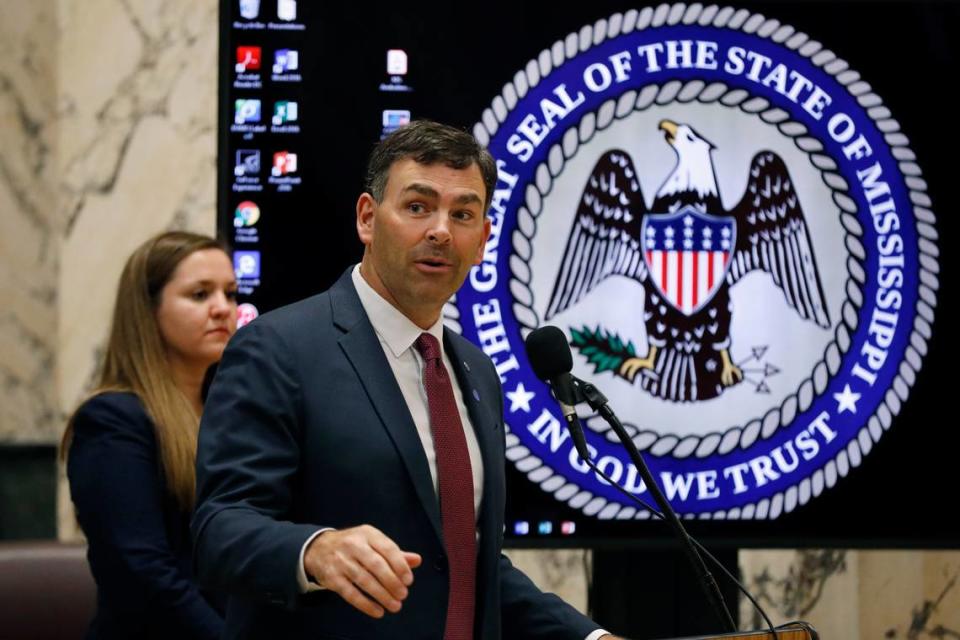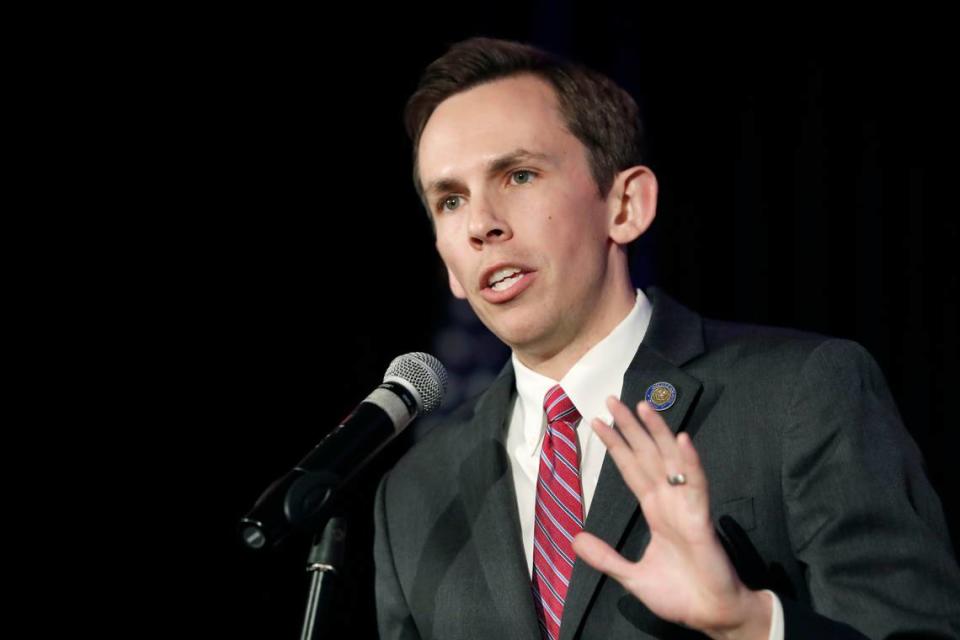What’s the best job security in Mississippi? Being a down-ticket Republican incumbent
- Oops!Something went wrong.Please try again later.
- Oops!Something went wrong.Please try again later.
The best job security in Mississippi might be winning an election, or in some instances appointment, to one of the down-ticket statewide offices.
The seven down-ticket statewide officials will be sworn in to begin a new four-year term next week during a joint session of the Mississippi Legislature. The swearing in will have the normal pomp and circumstance. The event will also be unusual because for only the second time since at least Mississippi’s 1890 Constitution was enacted, all seven statewide officials who will be sworn in after winning reelection this past November are incumbents.
When Gov. Tate Reeves is sworn in during the coming days, it will make for a clean sweep. For just the second time in state history, eight statewide officials will begin a new four-year term as incumbents.
All eight statewide officials being incumbents to begin a new four-year term is a recent occurrence. It also happened in 2015. Granted, until the 1980s there was never going to be a similar scenario — unless in the rare instances when an incumbent left office early — because the governor could not serve consecutive terms. In the 1980s, voters approved a constitutional resolution to allow governors to serve a second term. And in the 1990s, another proposal was passed to limit the lieutenant governor to two consecutive terms.

What’s next?
When statewide officials are sworn in to begin a new four-year term in 2027, there will be at the very least a new governor and lieutenant governor.
But more than likely, the other six statewide elected officials — Attorney General Lynn Fitch, Secretary of State Michael Watson, Auditor Shad White, Insurance Commissioner Mike Chaney, Treasurer David McRae and Agriculture Commission Andy Gipson — can stay in their current offices as long as they like.
For decades in Mississippi, the Democratic primary determined the winner of most elections. The Republicans generally put up a token, if any, candidate in the November general election to challenge the winner of the Democratic primary. The tough race was generally in the Democratic primary, not the general election.
That began to change in state elections in the 1990s.

The GOP edge
Republicans now have a similar advantage. It should be pointed out, though, that the past two elections — 2019 and 2023 — have proven that a Democratic candidate for governor can run a competitive campaign.
But in the so-called down-ticket races, Democrats with the exception of former Attorney General Jim Hood, who lost that 2019 bid for governor, have not had candidates able to run competitive campaigns. That is not to say the Democrats have not fielded some credible candidates, but they lacked the money, name identification and grassroots organization needed to challenge in a state like Mississippi, where a majority of voters are firmly affiliated with the Republican Party.
And once a Republican captures one of the statewide offices, usually after a tough primary election, he or she generally does not face a contender in reelection efforts. In the rare instance when incumbents have faced primary opposition, they have generally won by comfortable margins.
The last incumbent to lose a reelection effort was 2007, when long-time Insurance Commissioner George Dale was defeated in the Democratic primary by former state fiscal officer Gary Anderson. In part, Anderson took advantage of voter discontent with the insurance market after Hurricane Katrina pummeled south Mississippi to defeat Dale. But then Chaney defeated Anderson in the general election. Since then, the Republican Chaney has easily won reelection.
The future
Among the current crop of statewide officials, Gipson was appointed by then-Gov. Phil Bryant in 2018 to fill a vacancy after incumbent Agriculture Commissioner Cindy Hyde-Smith was appointed to the U.S. Senate. Gipson has cruised in his election efforts since then. White was appointed auditor by Bryant in 2018 to fill a vacancy after incumbent Stacey Pickering stepped down. After that appointment, White was able to do what all politicians dream of doing: run unopposed in 2019 for a full term as auditor.
Of course, the good news for wannabe statewide officeholders is that in 2028, the posts of governor and lieutenant governor will be open because of term limits. The conventional wisdom is that some — if not multiple officials holding the other six statewide offices — will opt to run for the vacant posts of governor or lieutenant governor in 2027.
That would mean that four years from now, there will be fewer incumbents being sworn among the pomp and circumstance during the joint session of the Mississippi Legislature.
This analysis was produced by Mississippi Today, a nonprofit news organization that covers state government, public policy, politics and culture. Bobby Harrison is Mississippi Today’s senior Capitol reporter.

